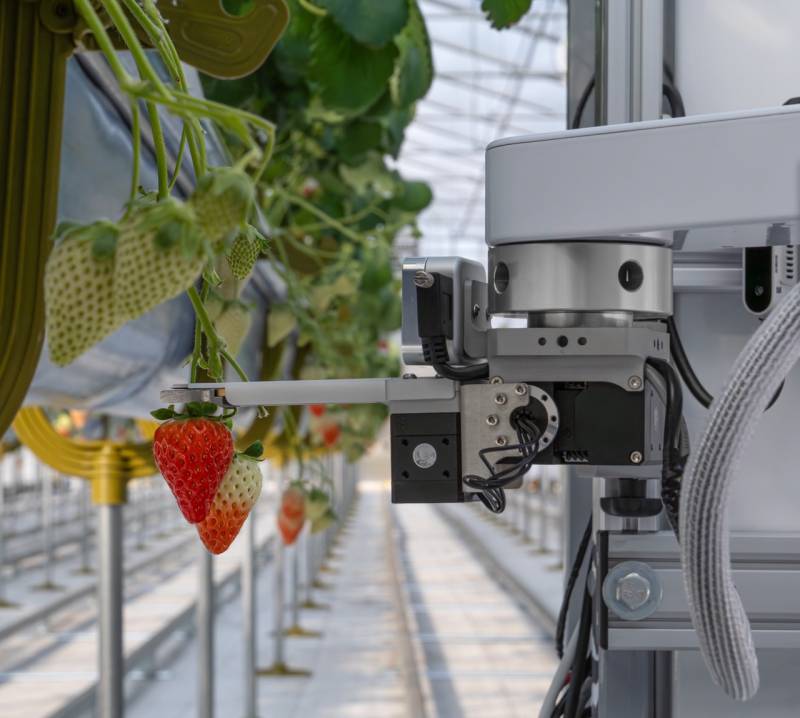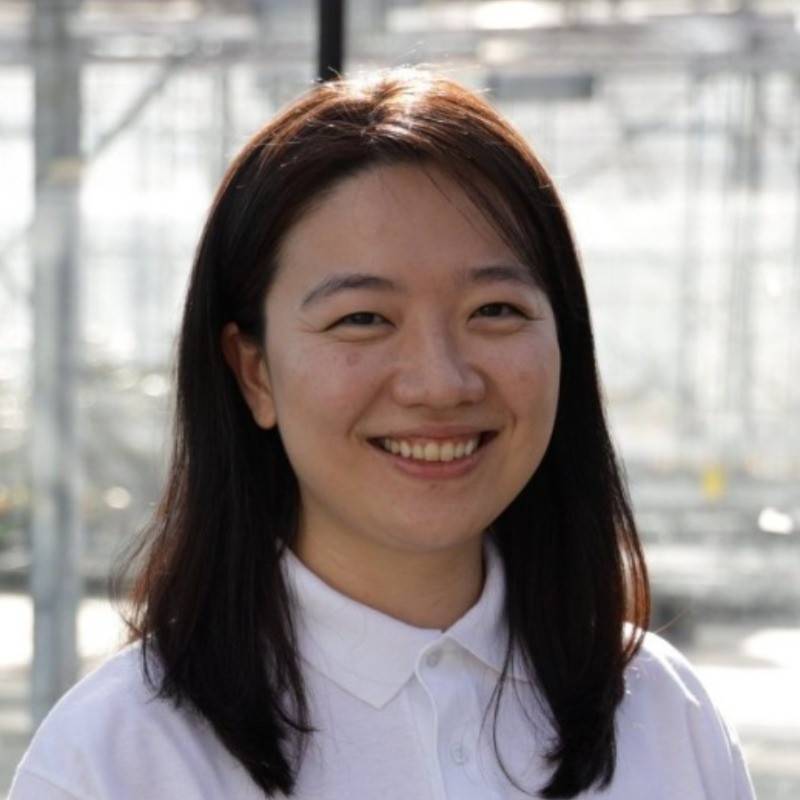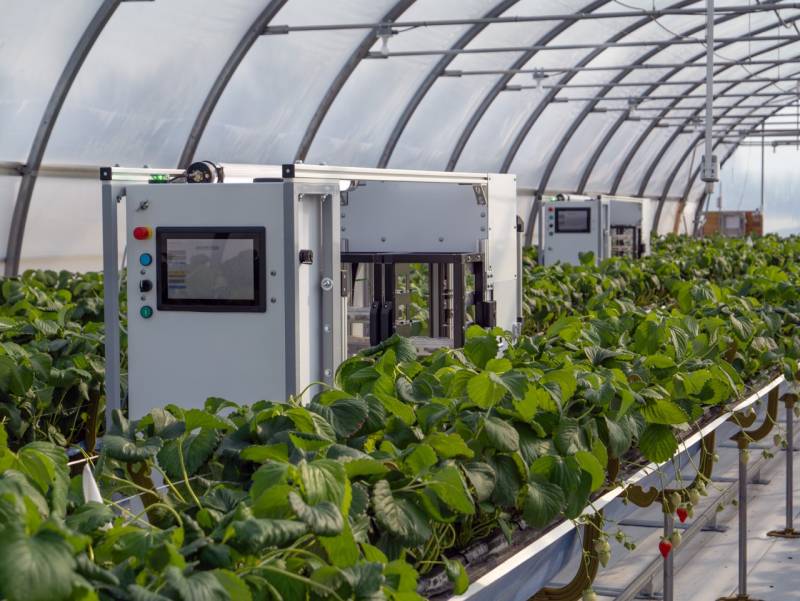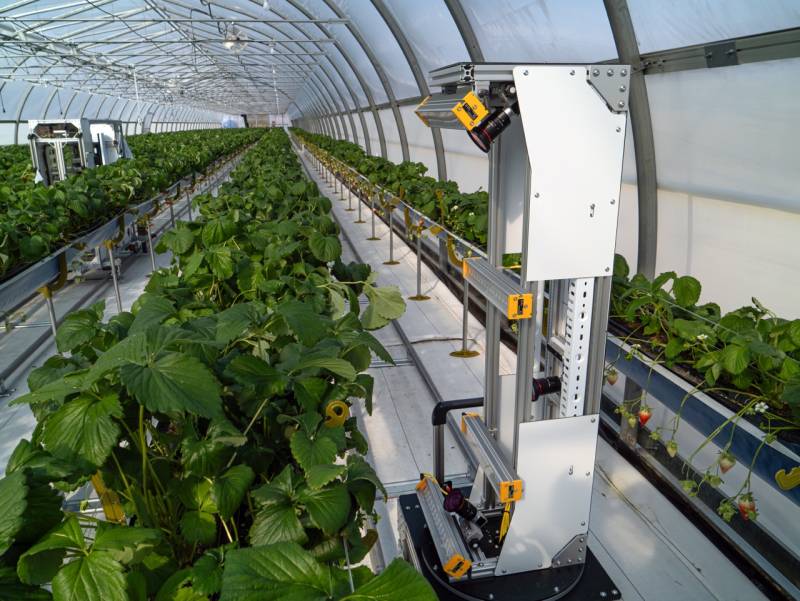
Submitted Photo
Tucked into rural Genesee County is a little-known greenhouse filled with automated technology. It’s overseeing a sweet crop of strawberries that just might turn agriculture on its head.
At least that’s what founder and CEO Gilwoo Lee is banking on with Zordi, her autonomous greenhouses with robots and artificial intelligence (AI) designed to make delicious, high-quality produce available anywhere in the world. Her company has two locations: the most recently acquired farm in southern New Jersey and, through the connection of co-founder and head grower Casey Call, a greenhouse in Oakfield.
Zordi has made the top 20 list for the annual Grow-NY, a business competition focused on enhancing the emerging food, beverage, and agriculture innovation cluster in upstate New York. Winning companies will be required to make a positive economic impact in the Grow-NY region, which includes 22 counties located in Central New York, the Finger Lakes, and the Southern Tier regions.
Lee isn’t quite certain what the pitch will be to snag the winning spot in the contest, but she knows her end goal.

“So basically what we need to prove out, is the largest market in the U.S. gonna love us?” she said. A native of South Korea, Lee has a unique vantage point of that area’s use of controlled environments.
"I applied to Carnegie University's Robotics Institute. That's like the number one when it comes to robots. So I started studying there, and then, long story short, I graduated from the University of Washington in Seattle with a Ph.D in AI and robotics. I really wanted to take that to where it felt personally, very meaningful and passionate about climate change sustainability and where there's labor shortage, and that led me to control the environment in agriculture like greenhouses and indoor farming in general,” she said. “One thing just historically is interesting about Korea, and that's kind of why I was a little bit more familiar, is that they do a lot of greenhouses, mainly because they get a lot more scarcity, like land, and not all the weather is as great as California. So I was just studying that and started my company.”
An AI roboticist and product of MIT, University of Washington and Carnegie Mellon University, Lee wants to build robotic greenhouses anywhere, and perhaps even more importantly, “deliver the best food.”
Before she could proceed, though, she needed to get the best farmer/grower for her initiative. After securing a venture capital company, she was able to meet with some 30 different head growers across the country.
She ended up meeting this one guy “doing a lot of greenhouses and vertical farm, indoor farm stuff. Turns out I really, really liked what the person that stood out the most, like way above everybody else in terms of the mission and expertise and knowledge, was working at a company called Plenty, which is in the Bay Area. It is the largest vertical farm, completely indoors, without sunlight,” Lee said. “And he was in charge of the production, and he was ready to basically, and it's super expensive, by the way, to do those things, so he was a little bit really looking for a more affordable, effective solution. And so I asked him to join the company ... So he was my first employee/co-founder.”
His name is Casey Call, son of Peter, president of My-T Acres in Batavia. Lee learned that Casey is a sixth-generation farmer, and she was drawn to Western New York. The co-founders ended up leasing a greenhouse that Pudgie Riner was retiring with Triple P Farms, she said.
"We were building a new greenhouse as a complete startup; it takes a lot of expertise, and we're like, how do we get this right? You don't have that much time. You kind of have time and money to kind of balance out, and Pudgie at Triple P was really kind to offer a greenhouse that was ready to retire. So we took that, and we are leasing it," she said. "We completely retrofitted it, put a lot of infrastructure to make it essentially, you can flip the season inside of the greenhouse. So that's how we started growing these very new, exciting varieties of strawberries that are really sweet varieties.
"And we've been very small, and that's why I've been very stealth, not necessarily stealth, it was just a really small growing them, running a robot," she said. "And as a startup, you do actually have to kind of prove it and put your best effort in one location.”
The crop has been small in volume and Zordi has sold to two stores in Manhattan, and is selling to a Wegmans in New York City, in addition to using family members as guinea pigs to taste test the sweet product, so no one locally will have seen it or been able to purchase these berries yet, she said.
Bottom line: venture capital investors are looking to confirm that Lee and Call know what they are are doing and can do it well before moving on to the next stage.
So what’s the next stage?
“We opened a second farm in South New Jersey as part of that kind of one step ahead for kind of proving our points," Lee said. "So we are running both of the farms. Both of them are still pretty tiny; we’re not actually scaling. It’s more like we’re proving these out across these two locations.”
The Oakfield greenhouse opened in September 2022, and Southern New Jersey a year later. They employ up to four full-time people and have three different types of robots on site: scout, which involves the robots moving throughout the greenhouse and capturing all of the growing data; harvest, to collect the plants; and spray the plants. The first two were built in-house, said Lee, an engineer who really likes robots, abstract things, math and computer science and loves it “when I can bring things to real life.”
She foresees using robotics in the greenhouse for other healthy fresh produce, such as cucumbers and tomatoes. As for the Grow-NY contest, “we’re still trying to hash out the best project, but this particular site and what we’re bringing in is certainly very innovative and futuristic,” she said.
“We have our own proprietary robots and AI kind of fully managing the greenhouses. We certainly have a lot of experts kind of coming in and really contributing. But really the ultimate goal is, can we make this farming easy enough for young growers to run these farms or young operators to run these farms and have really high yield and quality, that is what we’re tracking,” she said. “We do have, for example, monitoring robots that are running around the farm, literally capturing every single plant, every single day, and then the AI that’s making decisions, harvesting robots that are helping out all the harvesting labor, spraying robots.
"So a lot of these are automation to help the farms scale up. Those are the key things that we’re putting together and pushing demonstrating that it results in a much better quality product, enabling the better quality products to be delivered at a very affordable price," she said. "That, I think, is the ultimate goal of our business, and we’re starting that out. We have been proving that out in Western New York.”
Casey Call, who obtained his master’s in business administration from Boston University, was an agronomist for more than 15,000 acres at Grimmway, the largest carrot grower in the world, and head grower for Plenty, a leading vertical indoor farming system, floats between the two Zordi greenhouse sites in New York and New Jersey to manage them.
A total of 312 startups applied from 50 countries, including Canada, the UK, and Italy for the Grow-NY competition. Domestic teams also showed strong interest, with 26 states represented in the applicant pool, including 89 entries from New York. Forty-four percent of applicants included a female founder, and 60 percent included a founder from a culturally diverse group.
A panel of 30 judges, reflecting a depth and breadth of regional economic development expertise, knowledge of the region’s agriculture and food production communities, and entrepreneurial experience, reviewed all the applications to determine the top 20 finalists that will pitch their business plans at the Grow-NY Food and Ag Summit in Ithaca in November.
Grow-NY will award seven winners a total of $3 million in prize money. This includes a $1 million top prize, two $500,000 awards, and four $250,000 prizes.
Just two years ago, a local company, Craft Cannery of Bergen, won a $500,000 award for Paul Guglielmo's pitch. A tip for future applicant Lee, perhaps: he opted to play the soundtrack from the Broadway musical "Hamilton" to pump him up, and it really energized him, he said.
“From farming to food production, New York is an innovative, world-class leader in agriculture. Year after year, the Grow-NY competition is instrumental to bringing new, high-growth businesses in the industry focused on critical areas to our state,” State Agriculture Commissioner Richard A. Ball said. “This event has once again brought to light just how critical agriculture is to our communities and to our economy, and I congratulate these finalists on their innovation that will help bolster our food systems, feed our communities, and move our state forward.”
The last several months and leading right up to the final pitch have included mentorship opportunities, introductions to the region’s leaders and resources to connect applicants with potential partnerships and other strategic opportunities; site visits, business tours, industrial and economic development agency introductions, and pitch training.
The accelerator culminates with a live pitch at the Grow-NY Food and Ag Summit, scheduled for November 6 and 7 in Ithaca at the brand-new Downtown Ithaca Conference Center.
The Summit will be held in two formats simultaneously, in-person and virtually, with finalists pitching their business ideas live in front of an audience and answering questions from a judging panel. The event also includes a food and agriculture symposium, ecosystem expo, and student pitches. The 2024 Grow-NY winners will be revealed in a live awards presentation at the conclusion of the Summit.


